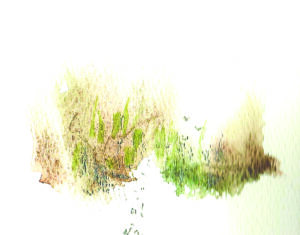walkingwiththunder.com
Dualities of verse
By Conrad Beaubien
At every window are the birds. The rewards of their company are more than an offset to the effort of getting on my boots and heading out to bring seed. Throughout the day the birds arrive and generally contest one another for a turn at the feeders. The jays or a squirrel lands and everyone clears out.
I’m a novice at bird watching, although it’s been something I have maintained for decades. I say novice because mostly I’m caught up in the awe of it and make mental notes, but am slow to follow-up by checking with my guide books to be able to toss out a name of species and sound like a real birder. The sublime of recent days is the arrival of a cardinal with bright pink tail and wing feathers. Yes, pink as in a ’60s Caddy pink. Is this an anomaly or a young male working its way through the colour spectrum I ask?
The beauty and innocence of new-fallen snow is a duality of thought and emotion. While my work offers the benefit of remaining insulated indoors, the realties are acute. Food becomes scarcer for animals in the wild as does travel through deep snow. On the farms the daily responsibilities don’t let up. Barn cleaning, feeding and animal care continues from before dawn and into evenings as farmers face the cold.
Historically, winter months influenced much of society in less obvious ways. The earliest winter roads were frozen waterways used by First Nations whose example was followed by newcomers from Europe. Travel was easier by sleigh over frozen creeks or along ice covered rivers and lakes. When distances were involved, this was the season for meetings and gatherings as getting there was facilitated; besides, no mosquitoes or black flies.
I think of the many customs that I have personal experience with that in so many ways maintains an appreciation and humility for the generations of humanity that have existed for millennia on the land we walk on today.
 Tapping trees both for their syrup and also one of many medicines; vitamin C from boiling spruce bark as one for instance; skills in designing and fabricating with various woods produced functional art forms like the canoe, the toboggan, snowshoes and lacrosse sticks. Europeans learned to use furs and gut string to make clothing and bedding.
Tapping trees both for their syrup and also one of many medicines; vitamin C from boiling spruce bark as one for instance; skills in designing and fabricating with various woods produced functional art forms like the canoe, the toboggan, snowshoes and lacrosse sticks. Europeans learned to use furs and gut string to make clothing and bedding.
While researching and thinking of the writings of the French priests who survived the winters thanks to the Huron people near what is today Penetanguishene, Ontario, I came across this descriptive from the seventeenth century from Francis Daniel Pastorius, the founder of Germantown, Pennsylvania. While this excerpt is not directly relevant to winter season, it is relevant as a reveal of the imposition of a European world view that accounts for much of the disparities we currently face in contemporary life in the Americas.
Pastorius wrote of the local people he encountered: “They strive after a sincere honesty, hold strictly to their promises, cheat and injure no one,” he remarked. “They willingly give shelter to others and are both useful and loyal to their guests,” he continued. “I once saw four of them take a meal together in hearty contentment, and eat a pumpkin cooked in clear water, without butter and spice.” Pastorius went on to describe ground utensils of mussel shells and plates of tree leaves, “which did not need washing up nor to keep with care for future use.”
He offered another observation which has stood against the era with lasting impact to this day. “I thought to myself, these savages have never in their lives heard the teaching of Jesus concerning temperance and contentment, yet they far excel the Christians in carrying it out.” Ironically, the Europeans believed that the differences between themselves and the Indians could be overcome in a civilized and religious environment. Thus, the “savages” could become just like them—European.
I think perhaps it’s the harshness of winter, less felt with modern day conveniences and enjoyments, that brings to mind how my ancestors thrived with due thanks for the support and friendship of First Nation people; it keeps me very much attuned to gratitude. My ancestors were also a part of the collective European imposition of a world view, which is now the responsibility of all of us as a factor to recognize. We can’t turn back time, but can only hope that lessons learned teach us to uphold personal truths and be less easily convinced by popular beliefs.
Considering our present era of re-evaluation of past human practices toward all forms of life on earth, the coming spring can offer not only a celebration of the gifts of nature, but to honour those who taught us how to enjoy the most simplest of traditions by way of the running of the sap and the enjoyment of the elixir of maple syrup.

Comments (0)